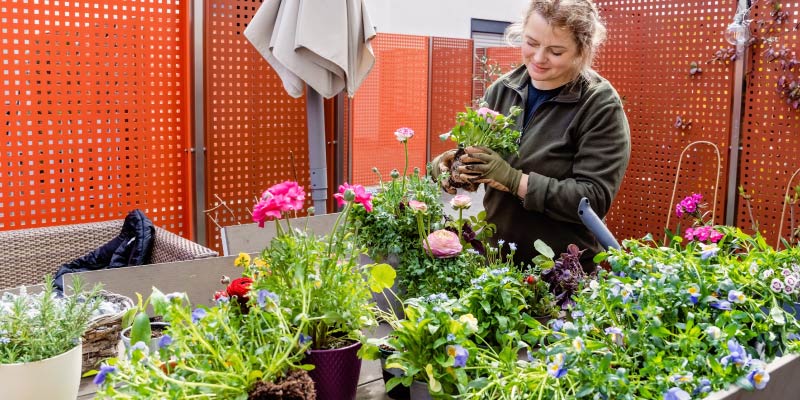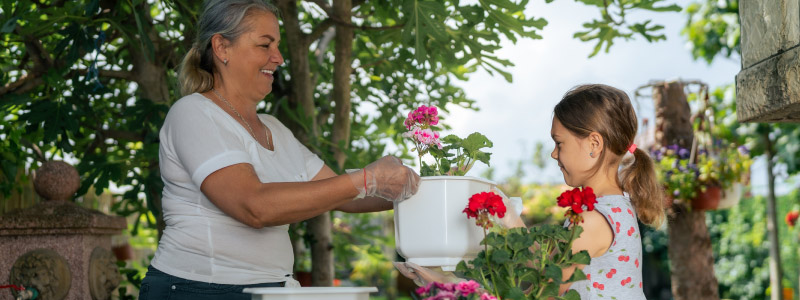Tips and tricks to make your garden eco-friendly

Matthew Harrington

Turning your garden into an eco-friendly space can be a daunting task, especially starting from scratch.
Many gardeners are faced with the difficult task of changing their typical gardens into environmentally friendly spaces.
The process might feel overwhelming at first. But remember, this is what distinguishes an average gardener from an eco-conscious gardener.
If you don't know how to create an eco-friendly garden sustainably, worry not, tips and tricks to make your garden more eco-friendly are here for your rescue!
Embracing eco-friendly gardening practices
By adopting eco-friendly gardening practices, you can save money and reduce waste while contributing to a healthier environment.
By adopting sustainable gardening practices, you are contributing positively towards combating climate change, reducing your carbon footprint, and creating healthier ecosystems.
The cost-effectiveness of organic gardening
Organic gardening methods, contrary to popular belief, can be cost-effective in the long run.
You're not only saving on chemical fertilizers but also promoting soil health which leads to less plant diseases and higher yield.
Sustainability beyond your backyard
Your eco-friendly garden does more than simply beautify your backyard. It plays a vital role in supporting local biodiversity by providing habitats for beneficial insects.
In our next section, we will delve into one such practice: mulching - its power as a tool for sustainability cannot be overstated.
The power of mulching in sustainable gardening
Understanding the power of mulching is a crucial step towards embracing sustainable gardening practices.
This simple technique not only helps to prevent weeds but also retains moisture, aiding you to conserve water.
Choosing the right mulch for your garden
Different soil types and plant needs require different kinds of mulch.
Various types are available at garden centres, including organic options like lawn clippings or bark chips that reduce your carbon footprint while enriching your soil.
Making an informed choice can contribute significantly towards reducing waste and promoting eco-friendly gardening.
The benefits of planting native species
Creating a sustainable garden involves more than just waste reduction and water conservation; it also means embracing the local ecosystem through native plants.
It's also about embracing the local ecosystem, which is where native plants come into play.
Nurturing local ecosystems with native plants
Gardening with native plant species provides food and shelter for beneficial insects and birds in your area.
This practice not only makes your garden more vibrant but also helps combat climate change by supporting biodiversity.
Beyond aesthetics: The ecological role of native flora
Native flora, unlike imported varieties, are well-adapted to local soil types and weather conditions.
This means they require less maintenance work, conserve water effectively due to their adaptability, and can resist local pests or plant diseases better than non-native species.
In our next section we will explore how you can further enhance sustainability in your yard by considering an often overlooked aspect - lawn size.
Reducing grass area for a more sustainable garden
The concept of reducing grass area in your yard is gaining traction as an effective sustainable gardening practice.
This strategy not only helps conserve water but also minimizes lawn clippings, thereby cutting down on green waste.
Low-maintenance plants for eco-gardens
A popular approach to this involves replacing traditional lawns with low-maintenance plants or creating raised garden beds.
such as native species and drought-resistant varieties, can thrive without much attention while adding aesthetic appeal to your landscape.
Besides being eco-friendly, these changes can save money by lowering maintenance costs and reducing the need for frequent watering.
By adopting these practices, you're taking significant steps towards minimizing your carbon footprint and promoting climate change resilience within local ecosystems.

Water conservation techniques in gardening
Gardens, while beautiful and beneficial, can consume significant amounts of water.
To promote sustainable gardening practices, it's essential to adopt methods that conserve water.
Rain gardens: A natural solution
A popular technique is the creation of rain gardens.
These are designed to collect runoff from roofs or other hard surfaces during a downpour.
Collecting rainwater: An old but gold method
An old-fashioned yet effective method involves using barrels or tanks to collect rainwater.
This not only saves money on your utility bills but also reduces demand for mains water which is particularly important in dry periods when supplies may be limited.
In this upcoming section, we'll explore the thrilling prospect of cultivating your own food in an eco-friendly manner.
Growing your own food sustainably
There's a unique satisfaction that comes from growing your own food.
This practice aligns perfectly with sustainable gardening practices, contributing to an eco-friendly lifestyle while also helping you save money.
Easy ways to start composting at home
An excellent way to enrich the soil in your garden is by composting kitchen scraps and green waste like grass clippings or annual flowers.
You can start small, using a dedicated bin for organic materials such as fruit peels, vegetable trimmings, coffee grounds and eggshells.
Avoid adding meat or dairy products which may attract pests.
The resulting compost pile will be nutrient-rich and perfect for promoting healthy plant growth without any harmful chemicals.
Choosing perennials over annuals
If you're aiming to cultivate a lasting garden, perennials are your go-to choice.
Unlike annual flowers that bloom for one season and then die off, perennials return year after year, reducing waste and saving money in the long run.
Saving seeds from annual flowers
You can also save seeds from your favorite annual flowers at the end of each growing season.
This practice not only saves money but it's an easy way to keep enjoying those blooms every year without buying new seeds or plants.
The saved seeds can be stored properly until next planting time - another step towards eco-friendly gardening practices.
Moving forward with these tips will help reduce our carbon footprint while creating beautiful gardens.
Next up is how we can further minimize environmental impact by choosing greener tools for maintaining our gardens...
Reducing air pollution with electric tools
When it comes to eco-friendly gardening, the tools you use matter.
Petrol-powered garden tools contribute significantly to air pollution and increase your carbon footprint.
EPA studies show that gas mowers emit harmful pollutants at a much higher rate than electric or manual ones.
The impact of electric-powered garden tools
In contrast, electric-powered garden equipment is not only quieter but also more environmentally friendly.
This transition to electric-powered garden equipment has the potential to make a significant impact on reducing emissions associated with global warming.
Making the switch to eco-friendly equipment
If you're ready for sustainable gardening practices, consider investing in an electric lawnmower or other battery-operated power tools available from many garden centres.
You'll save money on fuel costs while minimizing harm to our planet's atmosphere - truly a win-win situation.
Supporting pollinators through diverse planting
Promoting biodiversity in your garden is a key aspect of sustainable gardening practices.
By cultivating a variety of plants that attract pollinators, you can help to support and maintain biodiversity.
The importance of beneficial insects
Beneficial insects play an essential role in plant pollination, contributing significantly towards maintaining biodiversity within our ecosystems.
Gardens teeming with diverse flora not only create visually appealing spaces but also serve as habitats for these important creatures, helping combat climate change and promote eco-friendly gardening.
Choosing UK-grown cut flowers
If you're considering adding flowers to your garden or home decor, consider choosing UK-grown cut flowers.
This choice reduces carbon footprint compared to imported blooms while supporting local businesses and promoting environmentally conscious choices.
Besides being fresh and lasting longer, they often come without the excessive packaging associated with imports reducing waste further.
FAQs in relation to tips and tricks to make your garden more eco-friendly
How do you grow an eco-friendly garden?
An eco-friendly garden can be grown by implementing sustainable practices such as using organic fertilizers, planting native species, conserving water, reducing grass area, and supporting pollinators through diverse planting.
How are gardens eco-friendly?
Gardens become eco-friendly when they use less water, reduce waste through composting, encourage biodiversity by attracting beneficial insects and birds, and minimize the use of harmful chemicals.
How can I make my backyard eco-friendly?
You can make your backyard more eco-friendly by installing rainwater collection systems for irrigation purposes, growing your own food sustainably, and choosing electric or manual tools over petrol-powered ones to reduce air pollution.
What makes plants more sustainable?
Plants are considered more sustainable when they're perennials rather than annuals. They require less maintenance once established. Native plant species that adapt well to local conditions without needing extra watering or care also contribute towards sustainability.
Conclusion

It's all about going organic, reducing waste, and ditching harmful chemicals.
Mulching is your new best friend. This simple technique conserves water, reduces carbon footprint, and keeps those pesky weeds at bay.
Native plants? They're the unsung heroes of any garden. Not only do they require less work and water but also support local ecosystems in their fight against climate change.
And who needs grass when you have low-maintenance plants? By reducing grass area in your yard, you'll conserve more water while cutting down on green waste.
Growing your own food sustainably is another feather in the cap of eco-gardening - it's satisfying plus enriches soil with compost made from kitchen scraps!
Say yes to perennials over annuals for cost-effectiveness. And remember: electric tools are kinder to our air than petrol ones and luckily for you, there are ways in which you can monitor your garden from anywhere in the world with smart home security, get an indoor camera and never have to worry about anything going wrong in your garden.
Alternatively, get a stable internet connection that will help with research on how to maintain an eco-friendly garden and to also keep up with the latest online techniques.
Researching sustainable gardening techniques or ordering seeds online requires stable connectivity! That's where Homelinkd comes into play - we help compare various internet plans so that no matter where your location or needs lie, we've got an option for everyone.
Check out Homelinkd today, because even though gardens may be offline havens, modern life certainly isn't!










